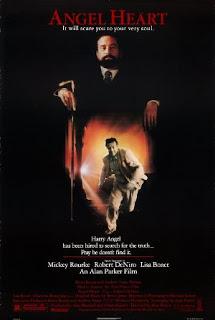
Directed By: Alan Parker
Starring: Mickey Rourke, Robert De Niro, Lisa Bonet
Tag line: "It will scare you to your very soul"
Trivia: Alan Parker claims that Robert De Niro's performance as Louis Cypher was so eerie and realistic that he generally avoided him during his scenes, letting him just direct himself
It was around my junior year in high school that I started collecting movie posters. I had found a mail-order company that sold theater-quality posters for a reasonable price, and each month I’d put aside a small portion of my paycheck so that I could place an order. Once they’d arrive, I would immediately tack the posters up on my bedroom wall, and while my collection was something of a hodgepodge, spanning many genres, I did have one “theme” wall that I dedicated to the movies of Mickey Rourke. At that point in time, Rourke was one of my favorite actors, and the films he made in the ‘80s were (for the most part) truly exceptional.
In my mind’s eye, I can still see the 5 posters that hung on that wall: Diner, Year of the Dragon, The Pope of Greenwich Village, Barfly, and, right smack dab in the middle of them all, 1987’s Angel Heart. A bleak, brooding mystery directed by Alan Parker, Angel Heart is a film that digs its way into your mind, offering up images that are simultaneously fascinating and disturbing, all in service of a story that grows darker with each passing scene.
Set in the mid-1950s, Angel Heart introduces us to private investigator Harry Angel (Rourke), who is hired by the mysterious aristocrat Louis Cyphre (Robert DeNiro) to track down a man named Johnny Favorite, who, before World War II broke out, was a popular crooner. As Mr. Cyphre tells it, he had a contract with Johnny, and helped him get his career off the ground. But before Johnny could make good on his part of the bargain, he disappeared into thin air, and Cyphre wants to know where the once-famous singer is hiding.
Though the case is a bit more involved than what he’s used to, Angel decides to take it, and after a brief stop at a New Jersey veteran’s hospital, which is the last place Johnny was seen (he had enlisted in the army in the early 1940s, and was badly injured during the war), Angel follows up on several leads that take him to Harlem, Brooklyn, and even down south to Louisiana. Yet despite his best efforts, Angel is no closer to finding Johnny than he was when he started, and what’s more, the people he’s been questioning are turning up dead, the victims of a particularly violent killer. Haunted by images he can’t explain, and with only one person left to interrogate: voodoo priestess (and Johnny’s daughter) Epiphany Proudfoot (Lisa Bonet), Angel gives some serious thought to throwing in the towel. But is he in too deep?
“This film has so many layers and textures that it’s as difficult as anything I’ve ever done”. This is how director Alan Parker described Angel Heart in 1987, and to be sure, the movie features a great deal of imagery that hints there’s more to this story than meets the eye. Thanks in large part to a series of recurring visions (a woman dressed in black whose face is never visible; an elevator that opens the minute he sees it; and Times Square on New Years’ Eve, 1943), Angel begins to wonder if the case is affecting his sanity.
Religion also figures prominently in the film, from the traditional (Angel meets Cyphre in a Catholic church to update him on the case) to the more offbeat (one night, Angel witnesses a voodoo ritual, during which Epiphany cuts the throat of a chicken and douses herself with its blood). What’s more, Angel discovers that Johnny Favorite was a huge follower of the occult; he had been romantically involved with a palm reader named Margaret Krusemark (Charlotte Rampling), and may have even dabbled in the black arts.
The deeper he delves into the life of Johnny Favorite, the more creeped out Harry Angel becomes, and his confusion and apprehension turns into full-fledged fear when those he’s been interviewing start to drop like flies. Dr. Fowler (Michael Higgins), who treated Johnny at the veterans hospital, seemingly commits suicide by shooting himself, while blues guitarist Toots Sweet (Brownie MgGhee) is found butchered soon after Angel questions him (someone cut off Toots’ penis and choked him to death with it). The fact that most of these murders occur off-screen does nothing to dull their effectiveness (we see the aftermath of several killings, which are plenty gruesome), and thanks to the film’s ominous tone, we’re just as on-edge as Angel through much of the movie.
Rourke delivers one of his finest performances as Harry Angel, a tough-as-nails investigator who would have been at-home in the film noirs of the ‘40a and ‘50s, yet finds himself dealing with otherworldly powers he cannot possibly understand. And then there’s Robert DeNiro, who, despite appearing in only a handful of scenes, is unforgettable as Louis Cyphre, a bizarre, sinister individual who acts as if he’s studying Angel each time they meet. All of these elements, plus a twist ending that ranks among the best I’ve ever seen, work in unison to make Angel Heart one very intense motion picture.
